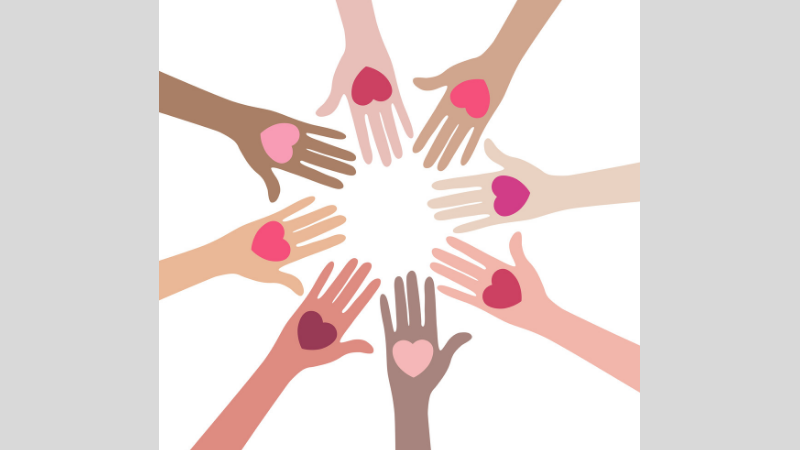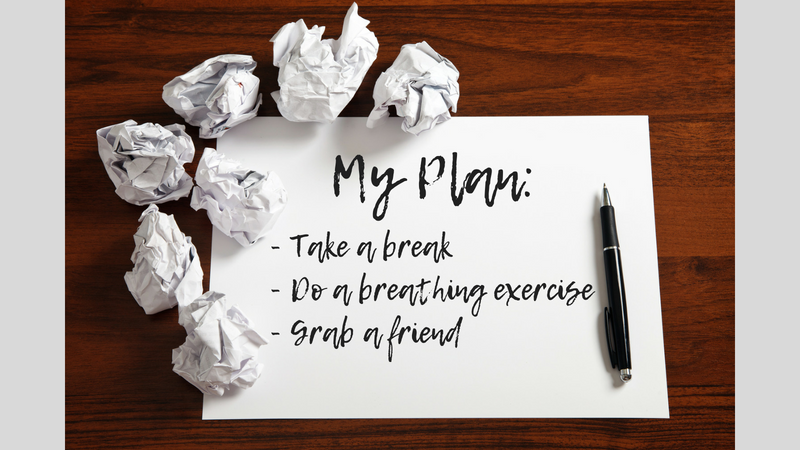Accepting Help Is a Sign of Strength
I’ve been leading support groups for a while now, and it’s interesting to see some themes emerge. One of the more interesting themes I’ve noticed lately is a DIY (“do-it-yourself”) attitude toward our mental health work; accepting help is not an option.
Overall, this is healthy and true. We are each responsible for our own emotional experience, and activities such as journaling, meditation, and mindfulness are typically solitary experiences.
In truth, these more solitary activities are foundations for the bigger work that comes down the road for us. As we start to heal our little wounds, we gain confidence in the process and the capacity to approach some of our deeper hurts.
I like to use the onion analogy: We start by handling all the surface layers, and as we make our way through each layer, we get closer and closer to the central issues of our lives.
As the healing continues, we start to see outward evidence of the healing. Maybe we begin to engage with our friends more frequently, or perhaps we start looking for a new job.
Inevitably, someone who knows us is encouraged by the progress we are making and offers a helping hand. “Hey, I know someone who is hiring; want me to make a recommendation?”
For the emotionally healthy, the default response here is “yes, please.”
For those of us in a storm, the offer is kindly refused. Accepting help is not acceptable.
This specific scenario has run out a couple of times in my group and also with some other friends who were struggling. When asked why they would refuse the help, the response is typically something like: “I want to know that I did it on my own.”
I think that this is at least partially a cultural response. Here in the United States, we worship at the altars of Ayn Rand and the proverbial bootstraps.
We adore the self-made person, holding each up as an example of what a little hard work and determination achieve. These examples are all false: accepting help is critical to success.
No one experiences success in a vacuum. We are all inter-reliant upon each other. To deny this core truth is to deny our essential humanity.
Humans, like primates, great cats, and elephants (and many other species), are social creatures. We rely on societal structures to help protect us, guide us, and meet our fundamental needs.
Homo sapiens is not designed to be a solitary, solely self-reliant creature. We are not commonly found in the middle of forests, individually foraging and making hunting tools while constructing shelter and fending off predators. We don’t come together solely for the purpose of propagating our species.
So why, WHY, do we insist that our success is only valid if we achieve it without any aid? Why do we view accepting help as a sign of weakness?
At least for those of us living with a mental illness, I think that this philosophy feeds into the already broken-records living in our brains.
In the same way that one small piece of criticism outweighs a mountain of praise, I think that the idea of accepting help touches on the sense of inadequacy our disorders implant deep in our psyches.
We rely on societal structures to help protect us, guide us, and meet our fundamental needs.
Our minds are already telling us that “everyone else is handling it” and “I should be able to do this,” distorting reality to the point that it is unrecognizable.
In this distorted mirror, accepting help looks like an admission of failure, instead of a recognition that we are human and interdependent upon each other. Sometimes, our accepting help is the right thing to do, just like everyone else does.
Beyond feeding into our sense of inadequacy, I think we also worry that having achieved our goal, we won’t feel the sense of accomplishment for it.
We discount our success when we see it as group collaboration, instead of taking pride in the piece of the puzzle that we contributed.
I’ve witnessed people (men and women, although more commonly with women) defer congratulations and praise on an accomplishment by pointing out all the ways they got help along the way.
One example that pops up is this gem: “I wouldn’t have gotten the promotion if Dave hadn’t spoken up for me.” This is an insidious example of discounting our success, because we forget that we had to impress Dave in the first place.
Would Dave speak up for us if he thought we weren’t qualified for the job? Wouldn’t he endorse a different candidate if he thought you weren’t up to snuff?
Underlying this is the cultural celebration of humility and self-deprecation. While being boastful or arrogant isn’t a good look on anyone, too often we lean in the opposite direction.
We don’t say, “I’m a great writer” or “I have a gift for public speaking.” Instead, we say, “I enjoy the process of writing” or “I’m not sure what audiences like about me, but I appreciate it.”
While being boastful or arrogant isn’t a good look on anyone, too often we lean in the opposite direction.
When we deny our gifts and our strengths, we deny that we also have areas of weakness. We can’t be amazing at everything; that’s simply not how we are designed.
When we understand our strengths, we gain insight into our weaknesses, too. One thing I’ve learned is that acknowledging my strengths allows me to acknowledge my weaknesses.
In recognizing those areas, I find the key points where I need help. That’s helped me recognize that accepting help is a sign of my strength.
Here’s a good example: I am pretty good in a one-on-one situation with a stranger or friend, and I handle myself reasonably well in groups up to eight or so people — when I already know most of them. However, attending networking events is my kryptonite. I am extremely uncomfortable with walking up to a stranger and introducing myself. This is a limiting weakness and one I’ve worked on with little improvement.
Does my weakness mean that I don’t deserve help?
My girlfriend, however, shines at these events. Knowing that I struggle, she pulls me along in her wake. I meet the people she meets, and she carefully weaves me into the conversation.
Once engaged with the new person, I am able to appropriately participate in the conversation and establish a new relationship. She provides me with an anchor of comfort and stability in what is, for me, a chaotic and overwhelming environment.
So, does my weakness mean that I don’t deserve help? Does it mean that I should just focus on making it better? Or should I allow my friend to use her strengths to help lift me up?
When I have gone off and done these events on my own, she’s expressed frustration with me. “Teresa, I love doing this stuff. I had nothing going on that night. Why didn’t you invite me?” When I don’t include her, when I don’t ask for her help, I deny her the opportunity to use her gifts and her strengths.
What kind of friend is that?
I’m not saying that accepting help is easy. I’m not saying that there isn’t merit in striking out on our own and learning to improve our areas of weakness.
I’m merely saying that we all have gifts, we all have strengths, and the more we focus on improving and operating within them, the happier and more effective we will be. And that leaves room for others to step into our lives and contribute in a meaningful manner.
In asking for help, in understanding that we are not meant to live this life alone, we build stronger relationships. Paradoxically, in allowing others to bolster our weaknesses, we gain more confidence in ourselves because we are operating in our areas of strength. That confidence is important to helping us feel better and progress on our road to mental health.
So, the next time you find yourself pursuing a DIY path to success, I encourage you to step back and examine your reasons. Regardless of what decision you make (to keep on as you are or to invite someone else in to assist), it becomes a decision and not a default mode of operation.
These are the decisions that lead to mental health. These are the decisions that lead to freedom.
What are some ways you ask for help? What are some ways you push through on your own? I’d love to hear from you in the Comments section!
Looking for daily inspiration and community? Join our warm and supportive Facebook group!









